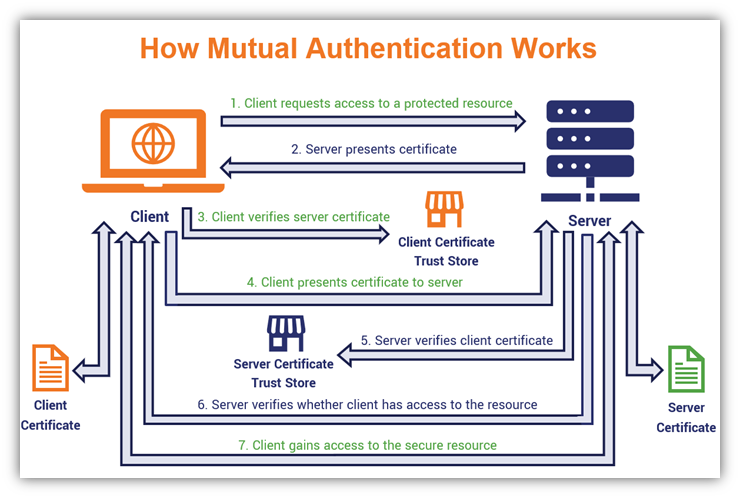Client Certificate Handling on iOS Demo
Explanation and Demonstration of Client Certificate Authentication on iOS.
Simulator.Screen.Recording.-.iPhone.11.-.2022-02-04.at.16.33.04.mp4
Complete YouTube video: https://youtu.be/qSzk-gMsFZ4
What is it?
Client Certificate Authentication is a mutual certificate-based authentication, where the client provides its Client Certificate to the server to prove its identity. This happens as a part of the SSL Handshake (optional).
How it works with ... ?
URLSession
URLSessionDelegate is required which implements URLSession:didReceiveChallenge:completionHandler: and returns URLCredential instance to resolve a client certificate authentication challenge.
WKWebView
WKNavigationDelegate is required which implements webView(_:didReceive:completionHandler:) and returns URLCredential instance to resolve a client certificate authentication challenge.
SafariViewController
Works when certificate was installed on the device in the Apple keychain access group.
Open link in Safari
Works when certificate was installed on the device in the Apple keychain access group.
Why apps cannot rely on installed certificates through Safari, Email or MDM ?
Users can install digital identities (certificates plus their associated private keys) onto their iOS devices by downloading them from within Safari, by opening them as email attachments, and by installing them with configuration profiles. Or, identities can be pushed from a Mobile Device Management (MDM) server. However, identities installed in any of these ways are added to the Apple keychain access group.
Apps can only access keychain items in their own keychain access groups. This means that items in the Apple access group are only available to Apple-provided apps such as Safari or Mail.
To use digital identities in your own apps, you will need to write code to import them. This typically means reading in a PKCS#12-formatted blob and then importing the contents of the blob into the app's keychain using the function
SecPKCS12Importdocumented in Certificate, Key, and Trust Services Reference.
This way, your new keychain items are created with your app's keychain access group.
Source: Technical Q&A QA1745 - Making Certificates and Keys Available To Your App
Demo App
iOS application to demonstrate the use of a client certificate for authentication.
Use this app to access https://client.badssl.com/ in various ways
- URLSession.dataTask
- WKWebView
- SFSafariViewController
- Open link in Safari
Website https://client.badssl.com/ requires a valid user certificate. Otherwise server returns HTTP 400.
For convenience, I added badssl.com-client.p12 (downloaded from https://badssl.com/download/) as a bundle resource. This allows you to test the successful authentication with a user certificate using URLSession and WKWebView.
Note: in case the certificate does no longer work (expires Dec 4, 2023) then try to download the latest version from https://badssl.com/download/.
Acknowledgments
-
https://badssl.com/ (open-source: https://github.com/chromium/badssl.com)
More Details about Client Certificate
A Client Certificate is a digital certificate which confirms to the X.509 system. A certificate contains an identity (a hostname, or an organization, or an individual) and a public key (RSA, DSA, ECDSA, ed25519, etc.), and is either signed by a certificate authority or is self-signed. It is used by client systems to prove their identity to the remote server.
The certificate public key as well as the correspinding private keya is stored in a.p12 files. The container format is password protected and therefore fully encrypted (unlike .pem files).
This is a password-protected container format that contains both public and private certificate pairs. Unlike .pem files, this container is fully encrypted.
You can use the openssl library to decrypt the p12 file, access the certificate or private key information and transform them. For example, to decode the certificate information stored in the encrypted file.
Input
openssl pkcs12 -in ./ClientCertificateSwiftDemo/badssl.com-client.p12 -nodes -passin pass:"badssl.com" | openssl x509 -text -nooutOutput
Certificate:
Data:
Version: 3 (0x2)
Serial Number: 17726285331827515185 (0xf6006a9766cbdf31)
Signature Algorithm: sha256WithRSAEncryption
Issuer: C=US, ST=California, L=San Francisco, O=BadSSL, CN=BadSSL Client Root Certificate Authority
Validity
Not Before: Dec 4 00:08:19 2021 GMT
Not After : Dec 4 00:08:19 2023 GMT
Subject: C=US, ST=California, L=San Francisco, O=BadSSL, CN=BadSSL Client Certificate
Subject Public Key Info:
Public Key Algorithm: rsaEncryption
Public-Key: (2048 bit)
Modulus:
00:c7:37:5f:11:eb:1e:4e:cf:eb:ba:48:e5:cb:a3:
12:2c:73:3e:46:1d:1e:9c:0d:c0:8b:83:23:da:c7:
65:df:5c:77:49:b3:e8:7a:7d:3c:ba:d5:61:8c:f9:
a5:c4:85:1d:92:23:06:e3:e7:df:7b:b3:7e:26:d0:
cb:1b:be:42:6b:16:69:f4:2c:72:b5:7e:e4:cb:0a:
28:44:12:6c:46:74:21:99:03:dc:6b:c3:11:58:02:
41:23:3f:b0:fc:bf:b7:00:59:13:22:a5:81:7f:24:
fe:d5:53:bc:4d:52:8f:90:4a:46:74:b0:e8:bd:93:
a6:cd:90:00:4a:2f:7f:b2:3f:a3:ea:03:3b:01:a0:
a2:0d:e6:53:7f:61:12:eb:a6:9b:03:9a:4e:a7:ad:
10:e8:e1:1d:c2:0f:ef:09:42:5f:6a:b8:4a:0e:98:
bd:b6:3d:cf:ea:a4:e8:cb:d6:38:0e:20:54:84:e7:
2d:e0:c1:bc:c3:95:f0:98:a0:02:f9:57:e6:f2:d6:
fb:b4:c8:94:a1:4d:32:bc:a2:8e:70:be:98:5c:15:
f1:07:69:0f:70:e6:31:60:da:1b:5d:ab:df:54:11:
1d:c1:2a:e3:43:b8:bf:b3:7a:3a:86:41:90:96:6f:
45:ec:93:c4:b9:58:1b:97:f2:5d:c1:ae:b8:39:82:
2a:8d
Exponent: 65537 (0x10001)
X509v3 extensions:
X509v3 Basic Constraints:
CA:FALSE
Netscape Cert Type:
SSL Client
X509v3 Key Usage:
Digital Signature, Non Repudiation, Key Encipherment
Signature Algorithm: sha256WithRSAEncryption
19:4b:36:8b:c5:bd:2a:d4:2e:02:ef:26:62:97:fd:ba:12:59:
03:a1:58:4d:07:0d:7e:9b:54:ac:93:b3:8f:20:7f:bc:b7:0d:
74:8e:0f:e6:c7:90:13:47:2f:48:5e:9b:81:d1:15:26:ab:8f:
ec:77:f3:da:22:3c:4b:62:e6:2d:76:36:0f:4e:2c:b1:f0:48:
72:be:ec:07:e7:ae:48:4b:1c:0f:0c:2f:73:56:c3:41:81:af:
90:e0:76:c2:2f:ec:c2:5d:18:8a:d7:3d:0c:13:37:98:fe:f8:
80:b2:63:9f:3c:4d:f1:87:1f:cb:d4:e6:a6:f9:3e:b4:aa:0a:
52:d9:49:21:d4:d3:91:53:af:f0:dc:d4:1f:21:2a:38:e5:77:
f1:4a:3a:27:4b:a3:56:03:2c:55:23:68:1f:71:d6:66:4f:52:
27:3f:0b:8f:3d:97:23:df:5a:a3:ea:a0:c4:5d:e6:2f:d7:4a:
14:93:e4:53:ef:7c:6b:8a:45:de:6a:5c:a0:e4:ae:7f:86:69:
0f:f8:88:30:dd:0a:07:a4:0c:20:8f:84:ec:2e:ba:56:af:37:
10:43:8d:28:70:66:dd:53:79:4a:d9:35:23:37:53:81:9e:65:
fc:ab:54:12:2e:4e:bf:a0:04:ae:08:90:3f:5d:fe:f3:fb:b1:
ad:8d:42:cc:c5:d3:04:50:b7:79:b5:c2:f4:96:c4:fc:fd:d5:
e1:fe:31:05:35:74:d3:f3:83:58:67:42:02:8a:22:b5:02:35:
36:9b:fc:20:26:49:07:ca:0b:5b:61:47:5e:6c:3e:0e:5b:13:
49:30:25:dd:40:27:50:2a:4e:b6:31:23:45:48:4d:45:7c:1a:
46:b7:b5:20:29:dd:a2:99:d8:b0:60:81:81:cb:23:64:6f:f6:
35:de:e5:8c:79:0d:c9:1f:de:5f:98:48:5a:7f:dd:d4:83:90:
53:a0:12:e6:66:d8:57:d9:97:8b:cd:05:1f:9c:a2:88:69:07:
df:b6:8d:15:8b:2b:ee:1f:22:40:89:6d:af:98:d9:c1:1d:e6:
eb:09:13:5f:0c:4c:7f:45:53:f2:4a:0f:0c:c2:f9:e3:bd:48:
d2:c5:53:0d:f3:19:4b:12:c2:06:6c:04:73:fa:92:24:0d:b2:
e8:9a:f6:ae:0c:e5:ff:ba:f2:4c:cc:e3:ed:0d:53:c1:f0:c3:
2c:d9:12:d9:93:06:19:2d:28:78:a3:13:18:b1:76:f8:e5:30:
06:7c:84:03:ac:16:27:ec:7a:f2:34:d3:67:54:62:fb:71:a0:
76:9e:5e:1e:23:a5:81:d5:36:7b:08:7f:fe:f8:b8:b6:a0:88:
f1:ed:55:fe:fe:f5:46:55
